Distinguished Fellowships
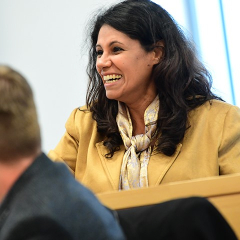
The Orthodox Christian Studies Center has provided fellowships to dozens of scholars at various stages of their careers and research projects. Their work has contributed seminal research to the fields of Byzantine history, Orthodox Christian tradition and contemporary geopolitical issues. The study covers the broad landscape of Orthodoxy, including among others: Albanian, Antiochian, Armenian, Bulgarian, Coptic, Greek, Russian, Serbian, Ukrainian, and American Orthodox.
Support from the National Endowment for the Humanities and other funders has been critical in helping to build a thriving community of scholars. While in residence at the Center, participants have access to Fordham’s vibrant academic community that creates space for intellectual exchange and broadens public scholarship.
Applications are now open for the AY 2025-26 fellowships. See the fellowship application instructions for details on how to apply.
Available Fellowships
Faculty Fellowship
Dissertation Completion Fellowship
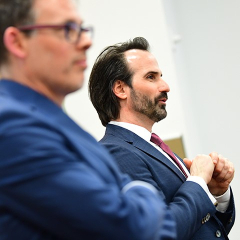
Funded by a grant from the National Endowment for the Humanities, each year the Orthodox Christian Studies Center invites applications for one Faculty Fellowship and one Dissertation Completion Fellowship in Orthodox Christian Studies. The Center welcomes fellows from all humanities disciplines whose projects focus on some aspect of the history, thought, or culture of Orthodox Christianity and contribute to fostering Orthodox Christian studies as a discipline in its own right.
Postdoctoral Fellowship in Armenian Christian Studies
Awarded in conjunction with the Zohrab Information Center at the Armenian Church of America (Eastern Diocese), the Postdoctoral Fellowship in Armenian Christian Studies is a two-year research fellowship (with the option for a third year of support) that doubles as the position of Director of the Zohrab Information Center.
Current Fellows
Alexis Torrance (Faculty Fellow)
Alexis Torrance is the Archbishop Demetrios Associate Professor of Byzantine Theology at the University of Notre Dame. His monographs include Repentance in late antiquity: Eastern asceticism and the framing of the Christian life ca. 400–650 (Oxford University Press) and Human Perfection in Byzantine Theology: Attaining the Fullness of Christ (Oxford University Press).
His third monograph, which he aims to complete as an NEH Faculty Fellow, is tentatively titled Recovering the Craft of Orthodox Theology: Understanding Seeking Union. This project attempts both to think through the nature of Orthodox theology as an intellectual discipline on its own terms—via close analysis of pivotal early, medieval, and modern sources on the question—while also bringing these findings to the table of the wider theological academy, particularly its debates over theological method. The project thereby seeks to address a twofold crisis: first, a crisis of Orthodoxy’s own self-understanding of the nature and task of theology; and second, a broader and ongoing crisis of identity in the theological academy. The book argues that a recovery of the ecclesial craft of Orthodox theology brings with it much-needed benefits not only for Orthodox Christianity, but for the discipline of theology as a whole.
Srdjan Maksimovic (Dissertation Completion Fellow)
Srdjan Maksimovic is a Ph.D. candidate in Theology at Fordham University, specializing in Judaism
and Christianity in Antiquity. His dissertation, “Christ the Refugee: Matthew 2:13-23 in the Context
of the Contemporary Global Migrant Crisis,” explores the Church’s theological and ethical
responsibilities toward migrants by placing early Christian interpretations of Christ’s flight into
Egypt in dialogue with present-day refugee realities. At its core, the project asks: How does
Orthodox theology articulate its duty toward the displaced in light of Matthew 2?
Combining scriptural exegesis, patristic commentary, and ethnographic fieldwork in refugee
communities and archives, including the Patriarchal Library of Alexandria and the Selakovac Refugee
Centre, this research presents Christ’s exile as a defining paradigm of divine solidarity with the
displaced.
Reframing the Church as a people in exile, formed not by civic permanence but by mystical
communion, the dissertation develops a liturgically rooted theology of sanctuary. It challenges
Orthodox theology to reckon with its eschatological origins in migration and its enduring
responsibility to those in flight.
Maksimovic’s work bridges Orthodox theology, refugee ethics, and public discourse,
proposing Christ the Refugee as a theological key for confronting displacement in a world on the
move.
Zachary Oliver (Dissertation Completion Fellow)
Zachary Oliver is a fourth-year DPhil (Ph.D) candidate reading Theology at the University of Oxford. He holds an MPhil in Theology from Oxford and a BA in Theology from the University of Exeter. His research interests focus upon early Christian monasticism, ancient philosophy, and the emergence of a Christian philosophical tradition.
His thesis, Action is the Path to Contemplation: Christian Philosophy and its Practice in the Thought of St Gregory of Nazianzus centres around one of the great Eastern Christian thinkers: St Gregory of Nazianzus and his concept of the philosophical life and the relation between the two components that form his understanding of philosophy, contemplation (θεωρία) and action (πραξις). While these two concepts had a long history prior to Gregory, his decision to incorporate them into a Christian framework and to live a ‘mixed life’, a synthesis of contemplation and action, produced one of Christendom’s first monk-bishops. Gregorian scholars have frequently called into question Gregory’s ability to harmonise these two components, but this thesis moves beyond such discussions and asks how it was possible for him to attempt to maintain this life in the first place? It answers this by arguing that Gregory’s philosophical life is built upon six ‘philosophical practices’: physical exercises (vigils, fasting, sleeping on the ground), meditation upon Christ and his death, attention to self, meditation on scripture, contemplative prayer and the contemplation of nature. Each of these practices satisfies, to varying degrees, each pole of contemplation and action.
Jesse Arlen
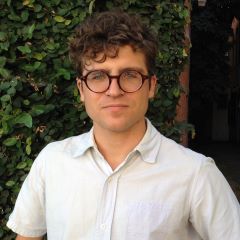
Jesse Siragan Arlen is a Ph.D. Candidate in Near Eastern Languages & Cultures at the University of California, Los Angeles, and Interim Director of the Krikor and Clara Zohrab Information Center. His research pertains to literature and intellectual history, with attention to education, asceticism, and mysticism in Eastern Christianity and Islam from the late antique to early modern period. His studies have appeared in peer-reviewed journals such as Viator, Manuscripta, Hugoye, and the Journal of the Society for Armenian Studies, and he has contributed chapters to several edited volumes.
His dissertation, “A Window into the Tenth Century: The Life and Literary Works of Anania of Narek,” uses this pivotal but understudied figure to offer new insights onto some of the major regional developments of the era from the Islamicate world to Byzantium. As part of the project, he is preparing the first translation into a modern language of Anania’s Book of Instruction (Khratagirkʿ).
His research has been supported by an Andrew W. Mellon Fellowship for Research on Minorities in the Middle East & North Africa, the Dolores Zohrab Liebmann Fund Fellowship, and a U.S. Department of Education Graduate Assistance in Areas of National Need Fellowship for Middle East & North Africa Studies.
-
Elena V. Kravchenko is a Senior Lecturer in Religious Studies at Washington University of St. Louis. She holds a PhD from the University of Texas at Austin.
Her fellowship project is a book tentatively titled Recovering Orthodox Christianity: Material Production of Religion and Race in the U.S. Each chapter of the book takes as a point of departure a material artifact or practice commonly utilized by the practitioners as an avenue to reach out to the divine, find a place within a like-minded community, and to resist racism. The distinct thematic focus of each chapter detailing how practitioners understood their relationship with the Theotokos, communicated with the saints, sang liturgical praises to God in and outside the sanctuary, dressed and ate, and decorated their bodies with devotional tattoos and produced religiously inspired comics navigates the diversity of opinions within African-American Orthodox communities about the origins of African-Americans as a people, of what their divine purpose may be, and what constitutes their religiosity. The book contributes to the field of Orthodox Christian studies by promoting a model for thinking about Orthodox Christianity not as a tradition that possesses "essential" qualities, but rather as a system of diverse interconnected practices that rely on the specific needs of Orthodox communities and individuals.
-
Stephen J. Shoemaker is Professor of Religious Studies at the University of Oregon. He holds a PhD from Duke University and is a specialist in the history of early Christianity and the beginnings of Islam.
His research project during the fellowship period, "The Hymns of the Ancient Jerusalem Church: A Translation of the Oldest Tropologion," will make available for the first time an English translation of the earliest extant collection of Christian hymnography, produced at the wellspring of early Christian liturgy, the church of Jerusalem. These hymns survive only in a Georgian-language translation made from the original Greek and have been lost in Greek due to the introduction of a revised Greek hymnal for the Jerusalem church in in the 7th century. Accordingly, these oldest hymns of the Orthodox tradition have been mostly forgotten and are almost entirely unknown even to specialists, and their translation into English is essential for a more complete understanding of both the history of ancient Christianity and the formation of Orthodox Christian faith and devotion.
-
Hannah Howard is a PhD candidate in sociocultural anthropology at Boston University.
Her dissertation, Liturgical Care: Theological and Political Belonging in Athenian Greek Orthodox Charity, sits at the intersection of anthropology, religion, and Orthodox Christian studies. Based on fieldwork in Athens, Greece with church-based aid organizations, the project ethnographically addresses how and why the Church continues to be relevant in a rapidly secularizing context. The project shows the Church's everyday power through an analysis of the intentions behind and enactments of "liturgical care," a form of relational care premised on theological commitments to love and iconicity. The project shows that while some Church actors use Orthodox theologies of love to elevate Christian supremacy and harden lines of exclusion, others use the same theology to inspire understandings of the divine within the human that blur conventional lines of difference.
-
Merih Danali is an Assistant Professor in the Department of Art at Wake Forest University, Winston-Salem, NC. Born and raised in Turkey, she received her B.A. in Economics from Bogazici University (2001), Istanbul, her M.A. from Penn State University (2007), and her Ph.D. from Harvard University (2019.) Her research has been supported by Princeton University’s Seeger Center for Hellenic Studies; Dumbarton Oaks Research Library and Collection; Koç University’s Research Center for Anatolian Civilizations; The Department of Byzantine and Modern Greek Studies at the University of Vienna. Her research interests include medieval aesthetics and Neoplatonism, the visual language of Byzantine astronomical and cosmological diagrams, medieval portraits, and crosscultural artistic exchanges between Byzantium and the Islamic world (ca. 1260–1453.)
During her Fordham fellowship, Danali will complete her first book, tentatively titled Art, Science, and Religious Devotion in Fourteenth-Century Byzantium. The project is situated at the intersection of Byzantine art, science, and Orthodox theology. It focuses on an understudied series of scientific and cosmological illustrations appended to Marcianus Graecus 516 (=904), a fourteenth-century Greek scientific miscellany. Unique in their thematic richness and pictorial inventiveness, the thirteen fullpage illustrations in the codex represent a wide variety of subjects, such as astronomy, musical theory, theology of history, eschatology, history of mathematical sciences, and humoral theory. Accordingly, Danali’s discussion crisscrosses various disciplines, utilizes such varied sources as
scientific treatises, letters, homiletic, early rabbinic, and patristic traditions, and incorporates them into the history of visual representation.The project examines the relations among the diagrammatic, figural, and textual elements on each folio to illuminate some of the most innovative ways in which visual language was put into intellectual use. The project demonstrates that even though thematically varied, the illustrations in the codex constitute a coherent program and reflect a particular worldview that blends Christian moral philosophy, Pythagorean number symbolism, and Platonic cosmology. This view had particular currency among the late Byzantine Neoplatonic astronomers such as Theodore Metochites (1270–1328) and Nikephoros Gregoras (1295–1360), who sought to establish the legitimacy of mathematical sciences as a means to unravel the principles underlying God’s harmonious universe and to “purify the soul and ma[k]e it more receptive to the truths of Revelation.” (Metochites, Semeioseis gnomikai.) By analyzing the ways in which the illustrations in
question blend science, cosmology, theology, and soteriology, the project seeks to underscore the rich and complex relationship between mathematical sciences and Orthodox dogma. -
Jennifer Lockhart is an Associate Professor of philosophy at Auburn University. She received a PhD in philosophy from the University of Chicago and has held an Andrew W. Mellon Postdoctoral Fellowship in the Humanities at Stanford University. Her research deals with contemporary ethical issues through a sensitive engagement with the history of philosophy. Her published work is in conversation with figures such as Plato, Kant, and Kierkegaard. She has written on topics including moral luck, constitutivism (in relation to ethical non-cognitivism), practical necessity, and moral worth. In a recent paper, she collaborates with a nurse midwife to put the contemporary practice of midwifery in dialogue with Plato's philosophy in order to develop a model for shared decision making in clinical contexts.
During her Fordham Fellowship, Lockhart will be working on a book project that situates Orthodox ascetic practices within a virtue ethical framework. The project begins by problematizing ascetic virtues (e.g. obedience, humility, chastity, vigilance, solitude, and poverty) within a classical virtue ethical scheme such as that of Aristotle. Virtues, as Aristotle theorizes them, have a certain logical structure. They are excellences that allow us to carry out our characteristic activity well—they allow us to live a flourishing life. But Aristotle recognizes that flourishing requires external preconditions such as friends, health, wealth, and political activity. The virtues, as they are classically understood, therefore contribute to these conditions for their own best exercise. The problem with the ascetic virtues is that they do not appear to have an internal teleology towards these goods. In fact, they can sometimes seem oriented in a different direction. Far from contributing to living a flourishing life, they can seem morbid or, to use Nietzsche's term, "life-denying." Lockhart's book explores the idea that the key to reconciling the classical logic of virtue with Christian ascetic practices is the Orthodox understanding of theosis. It is by death itself that Christ tramples down death. The ascetic virtues, therefore, are the virtues of theosis since they display the same paradoxical nature as Christ’s victory—in imitation of Christ, ascetic practices are a path directly through the shadow of death into true life.
-
Claire Koen is a doctoral candidate in the Judaism and Christianity in Antiquity program in Fordham University’s Theology Department. Her research interests include race, ethnicity, demonologies, and the use of color symbolism to distinguish good from evil during Late Antiquity. She employs papyrology, Coptic studies, postcolonial thought, and critical race theory in her research, while working in conversation with Eastern Orthodox Tradition. Originally from England, she grew up in Indianapolis and currently resides in Boston with her husband, two children, and wheaten terrier.
Her dissertation, titled Color Symbolism and the Construction of Demonologies in Early Egyptian Christianities: An Early Christian Technique of Identity Formation, centers around the Egyptian monastic writings of the 2nd-5th centuries, with a particular focus on the emergence of the trope of the “Ethiopian demon” and is intended to lay the historical groundwork for a further project of reckoning with the roots of anti-Black racism in present day Orthodox parishes and communities. Late Antique Egyptian monks were both concerned for the conversion of their dark-skinned Blemmyan and Nubian neighbors and prejudiced towards these neighbors on the basis of skin tone. The development of monastic demonological frameworks within the fraught socio-political context of Roman Egypt led toward the interweaving of cultural prejudices towards darker-skinned persons with genuine spiritual teachings. In order to consider the effects of color-coded language in antiquity, I trace the emergence of this trope through the study and translation of neglected but important sources, such as the sermons of Shenoute of Atripe, the Life of Paul of Tamma, and the Coptic Life of Aaron.
-
Reyhan Durmaz is an Assistant Professor of Religious Studies at the University of Pennsylvania. She received her PhD from the Department of Religious Studies at Brown University with a Joukowsky Outstanding Dissertation Award. She held a Junior Fellowship in Byzantine Studies at the Dumbarton Oaks Research Library and Collection and a Charlotte W. Newcombe Fellowship in Religion and Ethics. Her research interests include the history of Syriac Christianity, saints’ cults and hagiography, material aspects of religion, and Christian-Muslim interaction in the Middle Ages. Durmaz’s first book, Stories between Christianity and Islam: Saints, Memory, and Cultural Exchange in Late Antiquity and Beyond (University of California Press, 2022), analyzes the literary and social dynamics underlying transmissions of saints’ stories between Christianity and Islam.
During her Fordham fellowship Durmaz will work on her second book, tentatively titled Stone and Story in the Countryside: Medieval Christianities in the Rural Middle East. With this project, she seeks to explore the forms and expressions of Christianity in rural regions in the medieval Middle East, with an eye to destabilizing the urban-centric historical narratives that emphasize Christians’ survival under and adaptation to Islam. Christian communities in rural regions of the medieval Middle East are often studied in relation to monastic establishments or within the frame of theological developments, yet literary and material evidence suggests that the household played an equally important role in the formation of religious practice and community. By shifting the focus from cities, clerics, and monasteries to the countryside, laity, and households, the project aims to nuance our understanding of church administration, religious authority, community building, and interreligious encounter and exchange. Durmaz has recently published articles in the Journal of Near Eastern Studies, the Harvard Theological Review, and the Method and Theory in the Study of Religion on topics related to her new project on rural Christianities.
-
Katherine Karam McCray is a doctoral candidate at St Michael’s College, University of Toronto specializing in late antique moral philosophy and Eastern Christian ethics. She holds an MDiv from Princeton Theological Seminary and a ThM from St. Vladimir’s Orthodox Theological Seminary. Her research examines models for personhood with attention to how individual moral agency may restrict disability inclusion and fail to account for human dependency, especially extended states of dependency. She recently contributed to the Templeton Foundation supported grant project, Science and Orthodoxy Around the World, which will publish its third book. McCray’s chapter, “Dependency as Ontology,” examines how Athanasius and Maximus offer counter-traditions to individualist constructions of human nature, instead articulating the human being as innately dependent and interconnected.
Her dissertation examines the subspecialty of disability theology, a field initiated by systematicians and practical theologians to interrogate perceptions of ableism in the Christian tradition. A large theme in this field is the relationship between sin and disability. Where human nature is autonomous, rational, and independent, disability comes to represent degraded or fallen human nature as emblematic of extended states of dependency. Titled, “The Unattainable Body: Reconstructing a Theological Anthropology of Disability,” McCray’s dissertation argues that the association between sin and disability in Christianity can be dismantled with alternative anthropologies from within a diverse understanding of Christian tradition. The autonomous moral actor is not the only formulation for agency available in Christian practice and by pluralizing our sense of Christian history alternative models for human nature become available. McCray examines the shortcomings of individual autonomy when applied to disability and offers alternative constructions of autonomy, agency, and moral action that prioritize intercommunality and shared action. Her research has been supported by the Louisville Institute, the Redemptorists of Canada, and several Canadian ecumenical awards. McCray also serves as a theological consultant to the Assembly of Canonical Orthodox Bishops’ mental health ministries, contributing her research on disability to ongoing projects.
-
Amy Fallas is a PhD Candidate in the Department of History at UC Santa Barbara. She holds an MA in History from Yale University and works across the fields of modern Middle East and late Ottoman History, Religious Studies, and Archival and Memory Studies. Her research examines religious difference, communal institutions, the development of sectarianism, and historical memory in modern Egypt. She has published peer-reviewed work for journals such as the Journal for Religion, State and Society, the Arab Studies Journal, and the Connecticut History Review Journal. Her analysis and public scholarship appears in The Washington Post, Jadaliyya, the Tahrir Institute for Middle East Policy, the ABC Religion and Ethics Report, the Revealer, Sojourners, Religion & Politics, Contingent Magazine and more. Her research and writing has been generously supported by the American Research Center in Egypt (ARCE), the American Society for Church History (ASCH), the Society for Historians of American Foreign Relations (SHAFR), the Yale Center for Race, Indigenous, and Transnational Migration, the Borchard European Studies Foundation, the Orfalea Center for Global and International Studies, and the UCSB Center for Middle East Studies among others.
Entitled “Their Own Poor: Communal Identity, Charitable Societies, and the Making of Sectarianism in Modern Egypt 1879-1939” her project examines the formation, development, and popularity of charitable societies in Egypt during the nineteenth and twentieth centuries. With a focus on Coptic lay-based associations, she considers the meteoric rise and proliferation of charitable associations during this period as both a form of cross-confessional solidarity as well as communal boundary-making at a time when the meaning of sectarianism in Egypt was debated and forged. She argues that charitable societies were central to how religious communities articulated the boundaries of their identity and how they related to ‘others’ within the Egyptian national project during the nationalist movements of the late nineteenth and early twentieth centuries. -
Michele E. Watkins is an assistant professor of theology and religious studies at the University of San Diego. She earned her Ph.D. and M.Div. at Garrett-Evangelical Theological Seminary, Bachelor of Science in Psychology from Howard University in Washington, DC (Phi Beta Kappa, Summa Cum Laude), and a Certification in Non-Profit Management from Kellogg School of Management at Northwestern University. She will use her fellowship to work on her first monograph, tentatively titled Deification of the Desacralized: Critical Correlations Among Womanist & Orthodox Theologies. With this project, she uses a womanist methodology, a research method that places black women and their communities at the center of theological reflection, to critically analyze how the omission of race, gender, class, and sexuality in on the doctrinal principle of theosis preserves the status quo of white supremacy that devalues the sacrality of black women’s embodiment and personhood. She hopes to create a meaningful dialogue between Womanist and Orthodox theologians on the experience of salvation that affirms the sacred worth of black women and contributes to the survival and flourishing of marginal communities within a culture of epistemic and structural violence.
Watkins is the Executive Director for the Society for the Study of Black Religion, the oldest scholarly guild dedicated to the study and production of knowledge on black religious experience. Her research and forthcoming publications include work on black and womanist, patristic, and Orthodox theologies on faith, reason, and theosis; the political theology of Paul J. Tillich, and the post-theism of Friedrich Nietzsche and Delores S. Williams. -
Michael G. Azar is a deacon in the Greek Orthodox Archdiocese of America and Associate Professor of Theology/ Religious Studies at the University of Scranton in Pennsylvania, where he also directs the graduate program. He holds an MA in Theology from St. Vladimir’s Orthodox Theological Seminary and a PhD in Theology, with a focus on the New Testament, from Fordham University. His first book, Exegeting the Jews: The Early Reception of the Johannine “Jews” (Brill, 2016), examines Greek patristic readings of the infamous “Jews” of John’s Gospel, and he has otherwise published a variety of articles that examine the impact of the Bible in Eastern Christian-Jewish relations and related topics. His other scholarly pursuits include New Testament studies, especially apocalyptic thought and the "parting of the ways," and the effects that contemporary sociopolitical policies have on scholarly understandings of the ancient world. His current project, Reframing Christian-Jewish Relations in Light of Orthodox Christianity in the Holy Land, examines the ways in which Orthodox Christianity’s history, theology, and contemporary expression in Palestine and Israel can recontextualize the academic field of Christian-Jewish relations and the general Palestinian-Israeli-European/American interaction that it often affects.
-
Konrad Siekierski holds an MA in cultural anthropology from the University of Warsaw, Poland. His research interests include religion in Soviet and post-Soviet Armenia, identity formation in the Armenian diaspora, and modern Polish Catholicism. He is co-editor of Armenia: A Modern Culture from Anthropological Perspective (2014, in Polish) and Armenians in Post-Socialist Europe (2016), co-author of Armenian Catholics in Armenia and Georgia: History, Memory, and Identity (2019, in Polish), and author of several articles published in academic journals and collective volumes. His latest article, “Scripts, Saints, and Scientists: The Social Lives of Gospel Books in an Armenian Museum,” is to be published in the Spring 2021 issue of the Journal of Orthodox Christian Studies.
Konrad is a Ph.D. candidate in the Department of Theology and Religious Studies, King’s College London. Based upon ten years of ethnographic research, his doctoral thesis, A Vow to Go: Religion, Reunion, and Roots in Armenian Pilgrimage, examines the different forms that pilgrimage takes today in Armenian culture. It offers a novel conceptualization of pilgrimage as an act mobilized by cathexis and kinetic interactions with the sacred. This concept draws upon the Armenian Christian understanding of pilgrimage as ukhtagnatsutyun – ‘a journey to fulfill a vow.’ Along three main lines of inquiry – religion, reunion, and roots – Konrad’s dissertation examines how pilgrimage reflects and responds to larger social issues, such as the precarious living conditions of post-communist Armenia, the transnational character of the Armenian Christian community, and the trauma of the genocide that in many ways define Armenian identity and religiosity. By addressing these issues, his work combines Orthodox Christian Studies and Armenian Studies while offering a contribution that will speak to scholars both within and outside these two disciplines. -
Samuel Kaldas is a Lecturer at St Cyril’s Coptic Orthodox Theological College (Sydney College of Divinity) and currently an Anderson Junior Research Fellow at the University of Sydney. He holds a Grad. Cert. in Theology from St Andrew's Orthodox Theological College and a BA (Hons) in Philosophy and Ancient History from the University of Sydney, where he also completed his PhD in Philosophy analysing the origins and religious outlook of the seventeenth-century anti-Calvinist movement known as ‘Cambridge Platonism’. Recently, he has published journal articles and book chapters in patristics, Coptic theology and early modern philosophy. As part of his research role at St Cyril’s, he has contributed along with a number of scholars to the Archive of Contemporary Coptic Orthodox Theology, an online repository of primary sources of contemporary Coptic theology in English translation.
His project for the Coptic Fellowship aims to shed light on the theological dimensions of the ‘revival’ or ‘reform’ phenomenon which transformed the Coptic Church in the twentieth century, taking liturgical theology as a case study. Beginning with the liturgical theologies of early figures associated with the Coptic Theological Seminary and proceeding through the Sunday School Movement to important liturgical theologians of subsequent generations like Bishop Bimen of Mallawi and Fr Bishoy Kamel, the project examines how liturgical life and the Eucharist in particular proved to be a constant and inexhaustible source of inspiration for Copts during a momentous and often tumultuous century. The diverse and changing purposes for which Coptic theologians reflected on and appealed to liturgical life provide a fascinating snapshot of the evolving challenges that faced the reform movement over time. From polemical defences of liturgical ritual aimed at countering the critiques of Protestant missonaries to rich and mystical reflections on the Eucharistic essence of the Church, Coptic writing on the liturgy captures in microcosm the attempts of a large, diverse and often fractious theological community to articulate a Coptic Christian identity that was at once faithful to its ancient heritage, while robust and creative enough to meet the challenges of modernity. -
Ashley Purpura is Assistant Professor of Religious Studies in the School of Interdisciplinary Studies at Purdue University. She holds a Ph.D. from Fordham University and a M.T.S. from Harvard Divinity School. Purpura researches the history of Orthodox Christian thought, and investigates how historical religious practices and intellectual traditions shape structures and identities within past and present religious communities. Her first book, God, Hierarchy, and Power: Orthodox Theologies of Authority from Byzantium (Fordham University Press, 2018) offers a rethinking of the development and maintenance of “hierarchy” as a theological concept. Recently, she has published several articles on religious constructions of gender and authority.
Currently, Purpura is preparing her second book monograph, tentatively titled Sanctifying the Patriarchal Woman: (mis)Representing Gender Equality in Orthodox Christian Tradition. With this project, she uses a feminist premise to critically analyze the representation of women and equality in traditional Orthodox Christian religious sources. Although many examples of hagiography, hymnography, patristic theology, canon law, and hierarchically-issued statements claim women are spiritual equals to men, this equality is often implicitly qualified through the presentation of women’s humanity via androcentric priorities. Moreover, influential Orthodox sources present spiritual progress in terms of obedience, humility, service, asceticism, and becoming more fully human, but appear to leave little room for religious values that prioritize equality. Consequently, this project examines the ways Orthodox dogmatic claims nevertheless depend on affirming the full and equal humanity of women, and offers methodological resources for engaging tradition more inclusively.
-
Febe Armanios is a Professor of History at Middlebury College. She is an internationally recognized expert of Coptic Orthodox and Middle Eastern Christianity, and in the growing field of Food Studies. Her research focuses on comparative religious practices between Christians and Muslims, and among Orthodox, Catholic, and Protestant Christian communities of the Middle East and Balkans. She has explored everything from the veneration of saints and pilgrimages, to diverse food and fasting traditions, comparative gender roles, and the ways that different communities use media—particularly television—in the modern Middle East. Throughout the past two decades, her research has taken her to Egypt, Cyprus, Jordan, Greece, Lebanon, and Turkey, among many other locales. She is the author of Coptic Christianity in Ottoman Egypt (Oxford University Press, 2011) and the co-author (with Boğaç Ergene) of the award-winning Halal Food: A History (Oxford University Press, 2018). She has published multiple articles, book chapters, and blog entries, and has been interviewed as an expert on Coptic Christianity and the Middle East by numerous media establishments, including the New York Times, the Washington Post, the BBC, and CBS’s 60 Minutes. In the past, she also received several awards and fellowships including from the National Endowment for the Humanities, Fulbright, the Gerda Henkel Foundation, and the American Council of Learned Societies.
Her project “Coptic Orthodox Television: A Modern History” focuses on the history of Coptic channels in Egypt and the diaspora, as part of a larger book manuscript titled Satellite Ministries: The Rise of Christian Television in the Middle East. Her research situates the history of Coptic television channels within their modern Egyptian, Middle Eastern, and global landscapes—within a multifarious religious, political, and mediatic ecology. She explores the evolution of Coptic satellite channels, from 2005 till the present, as part of the Coptic Orthodox Church’s adaptation to new media technologies, shifting religious discourses, and onerous political pressures. Coptic channels were developed, at least initially, in reaction to an American televangelist presence in the Middle East and the rise of regional Arab Christian stations. In exploring this topic, she considers how Coptic clergy and laity found innovative ways to carve out a separate Coptic Orthodox identity within their diverse programming, which ranged from edifying liturgical broadcasts and talk shows to Coptic “hagiopics” (filmic hagiographies of Coptic saints) and lively music performances. Coptic media leaders achieved these feats in a regional context where public expression of Christianity had been often curtailed. In all, she argues that over the past several years, television has come to play a defining role in what it means to be a believing Middle Eastern Christian, and she emphasizes how Coptic-sponsored television has transformed traditional religion, created “virtual churches” in private homes, and beckoned the faithful to maintain their identity.
-
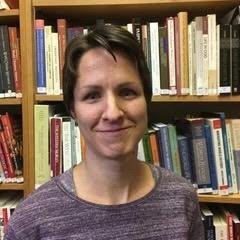
Joy Demoskoff is an Assistant Professor of History at Briercrest College and Seminary in Saskatchewan, Canada. She graduated with an honors B.A. in history from Crandall University, an M.A. from Queen’s University, and a Ph.D. from the University of Alberta. Her research interests include the history of modern Russia, historical approaches to the study of religion, and the history of Christianity. She contributed to the volume Orthodox Christianity in Imperial Russia, edited by Heather Coleman (Indiana University Press, 2014).
Joy is working on a book titled Sin and Crime in Imperial Russia: Healing Souls and Punishing Offence through Monastic Incarceration. It investigates the use of public penance as a disciplinary mechanism by both the Russian Orthodox Church and the Russian state authorities between 1721 and 1917. By examining the practices involved in caring for prisoners and in disciplining their behavior as found in the archival record, while also attending to the rhetoric of penance in the teachings of the church and in the imperial law codes, this book explores the relationship between the theology and the material history of public penance in the Russian empire. Drawing on the traditional Orthodox understanding of sin as disease and penance as medicine, it considers the degree to which healing and reconciliation through penance were possible in the imperial Russian context
-
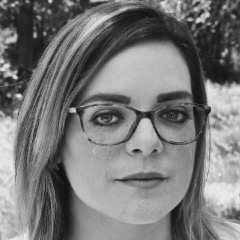
Sarah Riccardi-Swartz is a Ph.D. candidate in Sociocultural Anthropology at New York University. After completing an honors B.A. and M.A. in Religious Studies (American religions) at Missouri State University, she came to NYU to study and research religion and politics in the United States from an anthropological perspective. Along the way, she obtained a graduate certificate in Culture and Media (ethnographic filmmaking) and an M.Phil in anthropology from NYU. Her research interests primarily focus on new forms of conservatism, far-right religious communities, fundamentalism and traditionalism, and the ever-expanding political tensions between Russia and the United States.
Based on twelve months of fieldwork in the Appalachian Mountains with a community of Russian Orthodox Christians, Sarah’s dissertation examines the transnational, political implications of conversion alongside the social imaginaries of practitioners, paying close attention to new far-right, religio-political formations in rural economies. Russian Orthodoxy is often seen as a highly ideological, insular, and ethnically fragmented form of Christianity that rejects many of the socio-political values associated with the United States. Yet, it is attracting American-born, non-Russian converts at a steadily increasing rate, particularly in rural areas of the American South, Appalachia, and the Ozarks. Orthodoxy, often marginalized as a “Christianity of alterity,” is now being taken up by people from regions and communities that are themselves subjected to stereotypes of closure in the American imagination, thereby rendering these places and spaces as sites of global religio-political encounter. Sarah’s research complicates what it means to be a rural Christian, highlighting how long-standing political tensions between the United States and Russia are dramatized in the turn to an eastern faith.
Sarah’s dissertation research has been supported by New York University and the Jordan Center for the Advanced Study of Russia. In 2018-2019 she was a Louisville dissertation fellow for the study of American Christianity. In 2019-2020, alongside the NEH dissertation fellowship from the Orthodox Christian Studies Center, she will also be a Charlotte W. Newcombe Dissertation Fellow through the Woodrow Wilson National Fellowship Foundation.
-
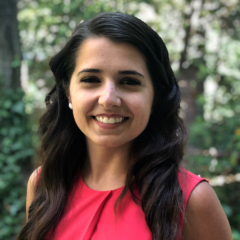
Candace Lukasik is a Ph.D. Candidate in Anthropology at UC Berkeley. Her research sits at the intersection of migration, religion, and politics with a focus on American geopolitical interest in Middle Eastern Christians. She has ongoing interests in secularism and secularity, the transnational politics of Muslim-Christian relations, and global Christianity.
Her dissertation project explores the transnational circulation of political subjectivities and religious practices through the lens of Coptic Orthodox Christian emigration from Egypt to the United States. For this work, she has received fellowships from the Social Science Research Council, the Louisville Institute for the Study of American Religion, the Institute of International Studies (UC Berkeley), and The Center for Middle Eastern Studies (UC Berkeley).
She has written opinion editorials and short-form essays for Public Orthodoxy, The Tahrir Institute for Middle East Policy, and The Coptic Canadian History Project (CCHP), and has published in The Alexandria School Journal and Middle East Critique. Since 2018, she has also been a co-curator for the Anthropology of Christianity Bibliography Blog (AnthroCyBib). The Orthodox Christian Studies Center has also included her as a participant in their project on Orthodox Christianity and Human Rights, funded by the Henry R. Luce Initiative on Religion and International Affairs and Leadership 100, between 2019-2022.
-
Maria-Alina Asavei (Faculty Fellow)
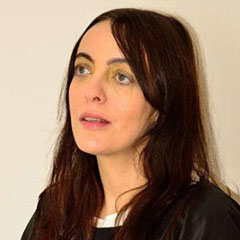
Maria-Alina Asavei is Lecturer at the Institute of International Studies, Charles University in Prague and Senior Researcher within Primus research project titled “Beyond Hegemonic Narratives and Myths.” She is also independent curator of contemporary art. Some of her most recent publications include: "Art and Religious Revitalization Movements in Post-Communist Romania: the Zidarus’ Case," Politics, Religion & Ideology (2017); "Call the Witness: Romani Holocaust Related Art in Austria and Marika Schmiedt’s Will to Memory", Memory Studies (2017), and “Nicolae Ceausescu: between Vernacular Memory and Nostalgia,” Twentieth Century Communism (2017).
Project
As part of her NEH research fellowship she will focus on Political Resistance through Religious Neo-Orthodox Art in (Post) Communist Romania. The aim is to demonstrate that in the Romanian (post)-communist social and political context, some religious/spiritual art productions reassessed and revisited traditional Orthodox religious discourses and narratives with the aim of mutually developing new identities from the bottom up. At the same time, these artistic productions re-enacted older religious narratives (both Christian-Orthodox allegories and elements from other world religions) as a tactic to circumvent the official understanding of the “religious” through artistic activism and grassroots mobilization.
-
John Zaleski (Dissertation Fellow)
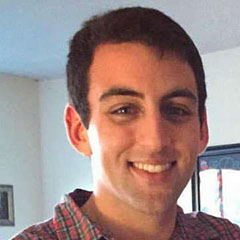
John Zaleski is a Ph.D. candidate in the Committee on the Study of Religion at Harvard University. After completing his A.B. in Religion and Classics at Dartmouth College, John came to Harvard to study medieval Christian and Islamic history. His research has concentrated on the eastern Mediterranean and the Middle East during the seventh through ninth centuries, a period of extensive exchange both among eastern Christian communities and between Christians and Muslims.
Project
In his dissertation, John examines the exchange and the transformation of Late Antique ascetic traditions, through the lens of East Syrian Christian and early Muslim writing on the central ascetic disciplines of fasting and celibacy. Although East Syrian monks were politically and confessionally separated from the Orthodox churches of Byzantium, they nevertheless created a vigorous commentary tradition in which they studied and debated about Greek monastic texts, and in so doing, significantly developed early Orthodox traditions of ascetic practice. At the same time, Muslim authors in the eighth and ninth centuries adapted, rejected, or transformed these broader Orthodox ascetic ideals, in order to create self-consciously Islamic traditions of ascetic practice. The dissertation thus expands our understanding of the development of a diverse and cross-confessional Orthodox Christian ascetic tradition and reveals the multifaceted engagement of Muslim authors with this tradition.
John has undertaken research for his dissertation at Harvard University and, from September 2016 to May 2018, as a William R. Tyler fellow at Dumbarton Oaks Research Library and Collection. In addition, his research has taken him to examine Syriac and Arabic manuscripts in Birmingham, Fes, Istanbul, London, and Paris. He looks forward with great pleasure to joining the rich intellectual community of the Orthodox Christian Studies Center as he completes his dissertation.
-
Biography:
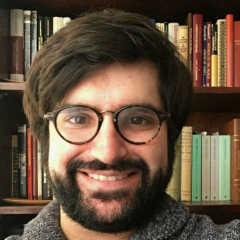
Aram G. Sarkisian is a doctoral candidate in the Department of History at Northwestern University studying the late nineteenth and early twentieth century United States, with a particular focus on American religious history. A native of the Detroit area, Aram holds a BA in Russian and East European Studies from the University of Michigan and an AM in Social Sciences from the University of Chicago.Aram is currently a T.H. Breen Fellow at the the Chabraja Center for Historical Studies, Northwestern University, where he is organizing the conference: "Walls and Bridges: Migration and its Histories."
Project:
Aram's dissertation, titled "The Cross Between Hammer and Sickle: Russian Orthodox Christians in Red Scare America, 1908-1924," is a study of the Russian Orthodox Church's North American Archdiocese in the crucible of immigration, war, American nativism, and transnational crises wrought by the rise of Bolshevism. His project draws on a wide variety of English- and Russian-language sources, from church newspapers and administrative documents to reports and records produced by various United States government agencies, to tell a unique story about the interplay between members of a beleaguered immigrant church and an emboldened and wide-reaching federal state. Aram's dissertation argues that the mechanisms used by the federal government to out "radicals" thought to be fomenting a Bolshevik revolution on American soil, as well as national rhetoric encouraging the coercive "Americanization" of immigrants, were primary tools clergy and laity alike utilized to reinvent what it meant to be a Russian Orthodox Christian in a post-revolutionary world.